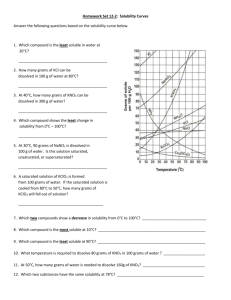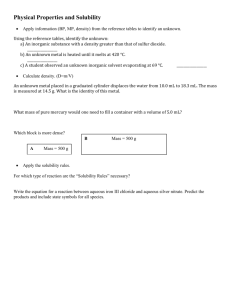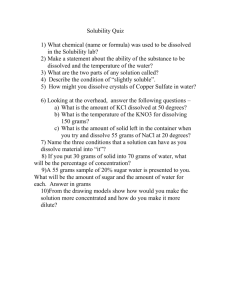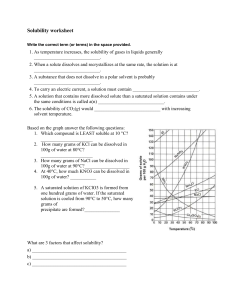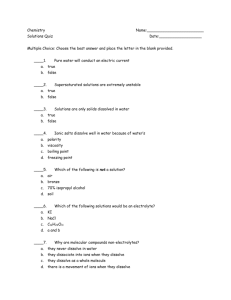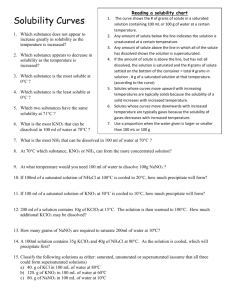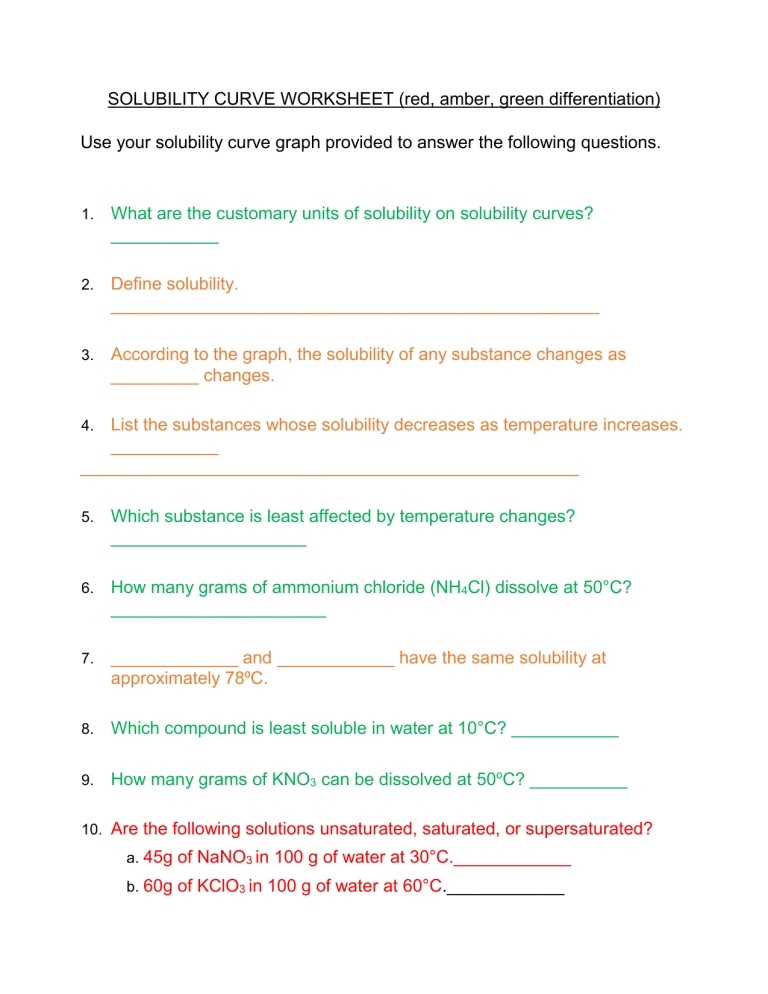
SOLUBILITY CURVE WORKSHEET (red, amber, green differentiation) Use your solubility curve graph provided to answer the following questions. 1. What are the customary units of solubility on solubility curves? ___________ 2. Define solubility. __________________________________________________ 3. According to the graph, the solubility of any substance changes as _________ changes. List the substances whose solubility decreases as temperature increases. ___________ ___________________________________________________ 4. 5. Which substance is least affected by temperature changes? ____________________ 6. How many grams of ammonium chloride (NH4Cl) dissolve at 50°C? ______________________ 7. _____________ and ____________ have the same solubility at approximately 78⁰C. 8. Which compound is least soluble in water at 10°C? ___________ 9. How many grams of KNO3 can be dissolved at 50oC? __________ 10. Are the following solutions unsaturated, saturated, or supersaturated? a. 45g of NaNO3 in 100 g of water at 30°C.____________ b. 60g of KClO3 in 100 g of water at 60°C.____________ 11. How many grams of sodium chloride, NaCl are required to saturate 100 grams of water at 100° C? __________ 12. How many grams of NaNO3 are required to saturate 100 grams of water at 90°C?____ 13. How many grams of KI will saturate water at 20°C?________ 14. At what temperature would 25g of potassium chlorate (KClO3) dissolve? _______ 15. At what temperature would 55g of NH4Cl dissolve? ________ 16. 89 g NaNO3 is prepared at 30°C. a) Will all of the salt dissolve? ____________ b) What mass of NaNO3 will dissolve at this temperature? __________ 17. If 25 grams of NH4Cl is dissolved at 50°C, how many additional grams NH4Cl would be needed to make the solution saturated at 80°C? _________ 18. At 50°C, how many grams of KNO3 will dissolve? _________ 19. At 70°C, how many grams of cerium (III) sulfate (Ce2(SO4)3) dissolve? __________ 20. Determine if each of the following is unsaturated, saturated, or supersaturated. a. 55g of NH3 at 20oC._________ f. 80g of NaNO3 at 10oC. ._________ b. 10g of Ce2(SO4)3 at 10oC._________ g. 145g of NaNO3 at 80oC. ._________ c. 125g of KNO3 at 60oC. _________ h. 35g of NaCl at 100oC. ._________ d. 65g of NH4Cl at 80oC. _____________ e. 12g of NH3 at 90oC. ______________ SOLUBILITY CURVE WORKSHEET KEY Use your solubility curve graphs provided to answer the following questions. 1. What are the customary units of solubility on solubility curves? Degress Celsius and grams of solute/100g of water 2. Define solubility. A measure of how much solute can dissolve in a given amount of solvent. 3. According to the graph, the solubility of any substance changes as temperature changes. 4. 5. List the substances whose solubility decreases as temperature increases. NH3 and Ce2(SO4)2 Which substance is least affected by temperature changes? NaCl, 6. How many grams of ammonium chloride (NH4Cl) at 50°C? 7. NaCl 8. Which compound is least soluble in water at 10°C? KClO3 9. How many grams of KNO3 can be dissolved at 50oC? 80g 50g and KClO3 have the same solubility at approximately 78oC. 10. Are the following solutions unsaturated, saturated, or supersaturated? a. 45g of NaNO3 in 100 g of water at 30°C. saturated b. 60g of KClO3 in 100 g of water at 90°C. supersaturated 11. How many grams of sodium chloride, NaCl are required to saturate 100 grams of water at 100° C? 40g 12. How many grams of NaNO3 are required to saturate 100 grams of water at 75°C? 140g 13. How many grams of KI will saturate water at 20°C? 33g 14. At what temperature would 25g of potassium chlorate (KClO3) dissolve? 600C 15. At what temperature would 60g of NH4Cl dissolve? 700C 16. 89 g NaNO3 is prepared at 30°C. a) Will all of the salt dissolve? No_ b) What mass of NaNO3 will dissolve at this temperature? 95g 17. If 50 grams of NH4Cl is dissolved at 50°C, how many additional grams NH4Cl would be needed to make the solution saturated at 80°C? 15g 18. At 50°C, how many grams of KNO3 will dissolve? 80g 19. At 70°C, how many grams of cerium (III) sulfate (Ce2(SO4)3) dissolve? 5g 20. Determine if each of the following is unsaturated, saturated, or supersaturated. a. 55g of NH3 at 20oC supersaturated f. 78g of NaNO3 at 10oC. saturated b. 10g of Ce2(SO4)3 at 10oC unsaturated g. 145g of NaNO3 at 80oC. saturated c. 110g of KNO3 at 60oC. supersaturated h. 35g of NaCl at 100oC. unsaturated o 65g of NH4Cl at 80 C. saturated e. 12g of NH3 at 90oC. supersaturated d.
